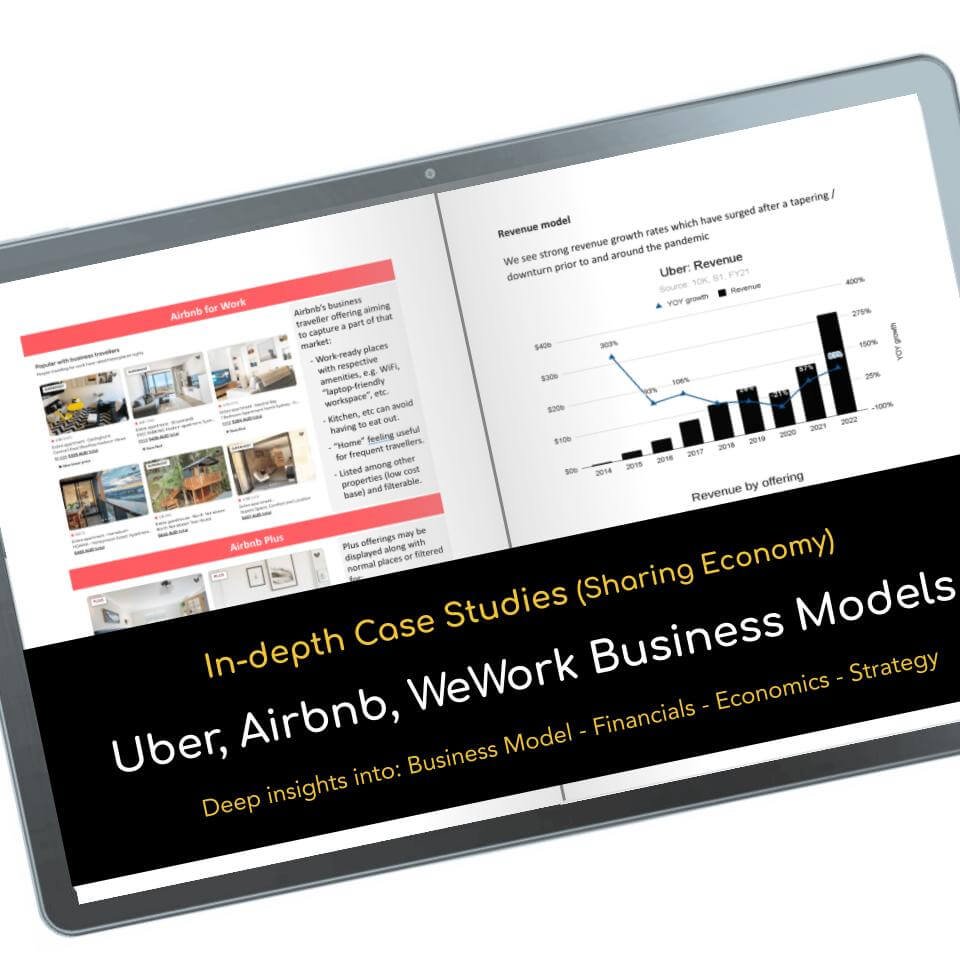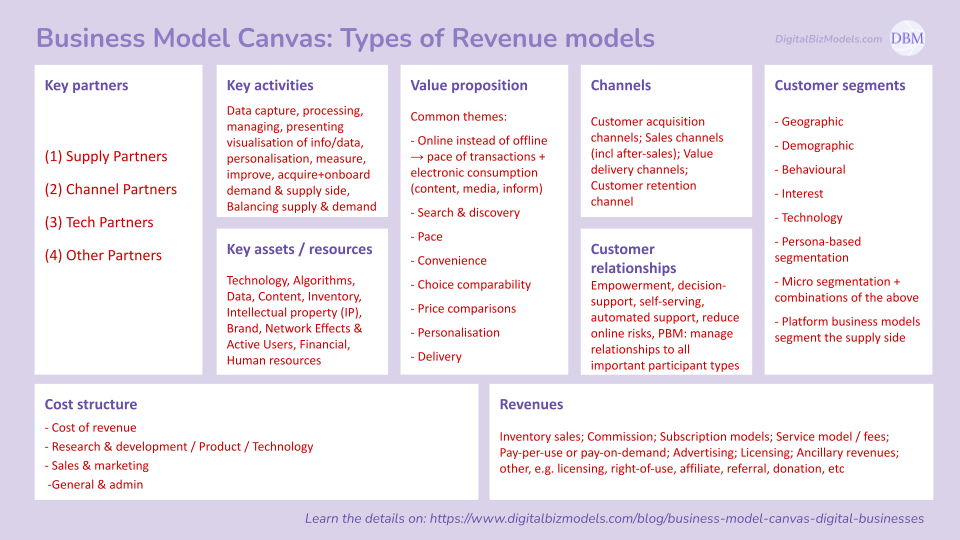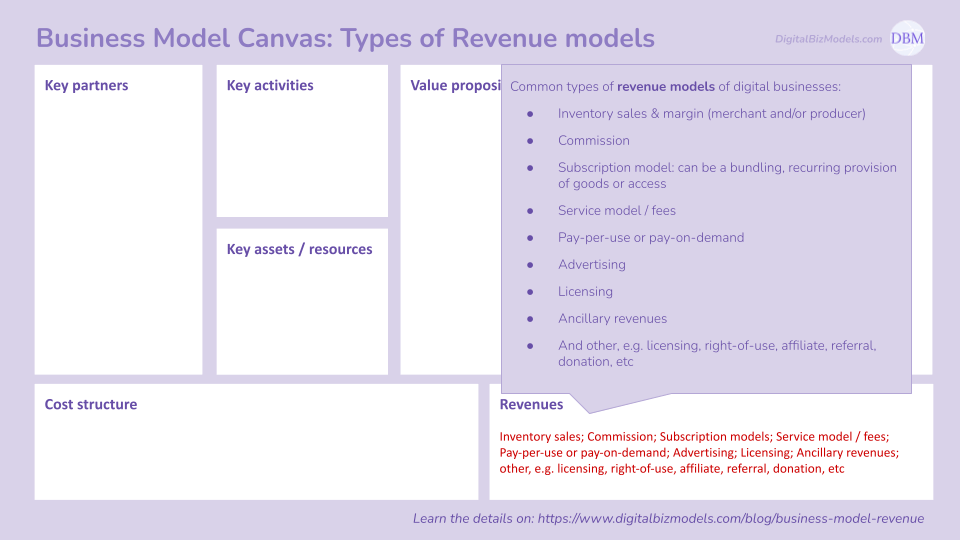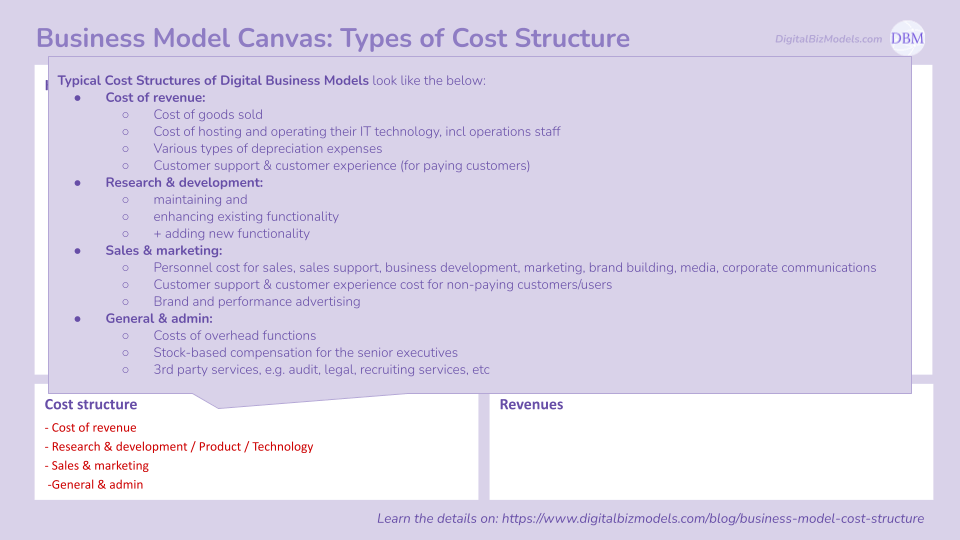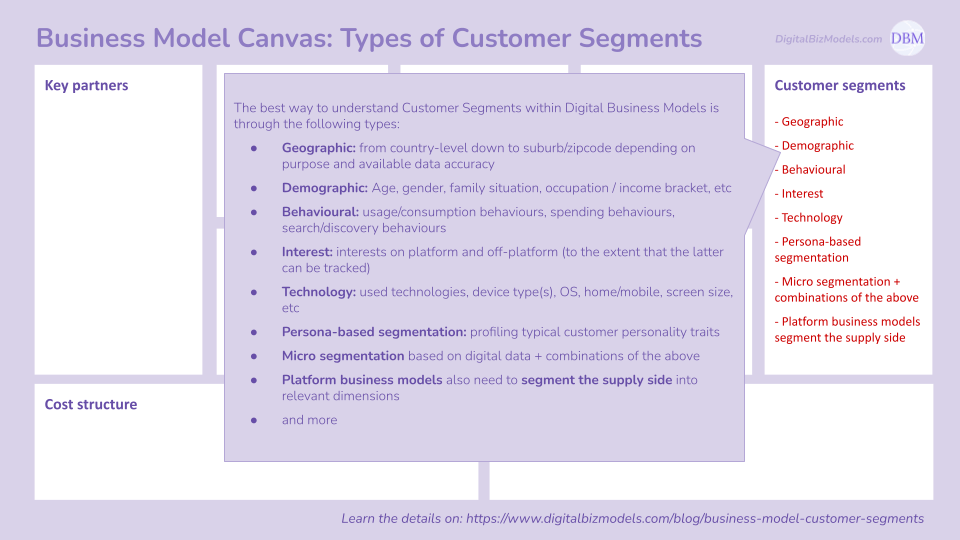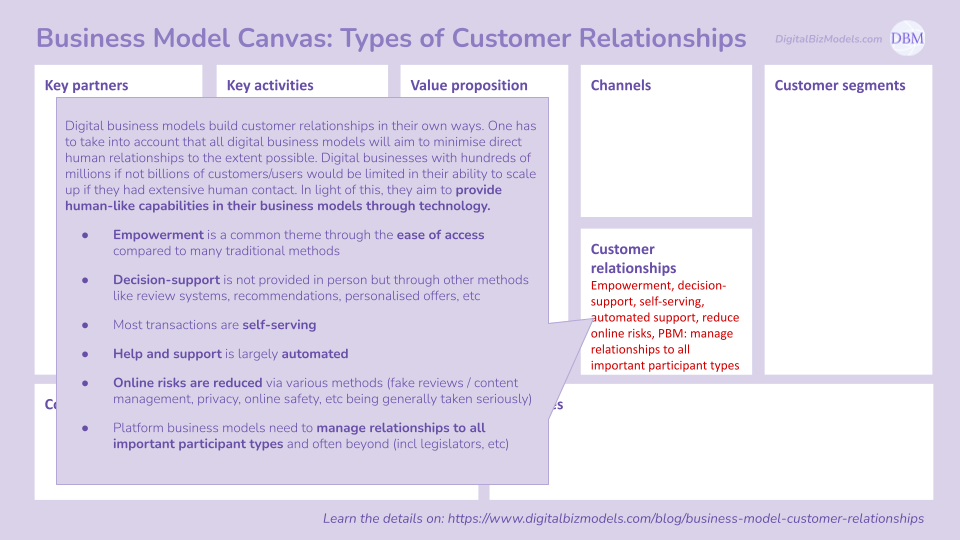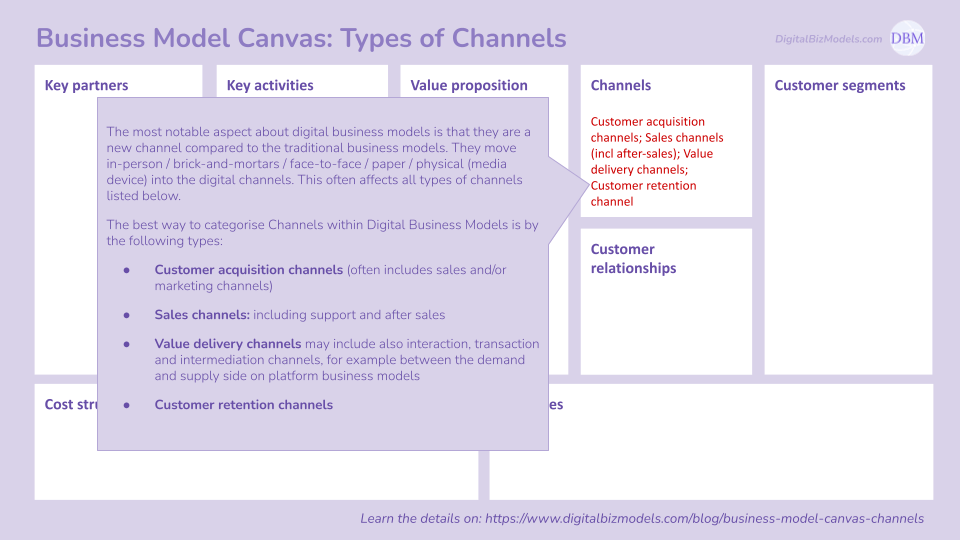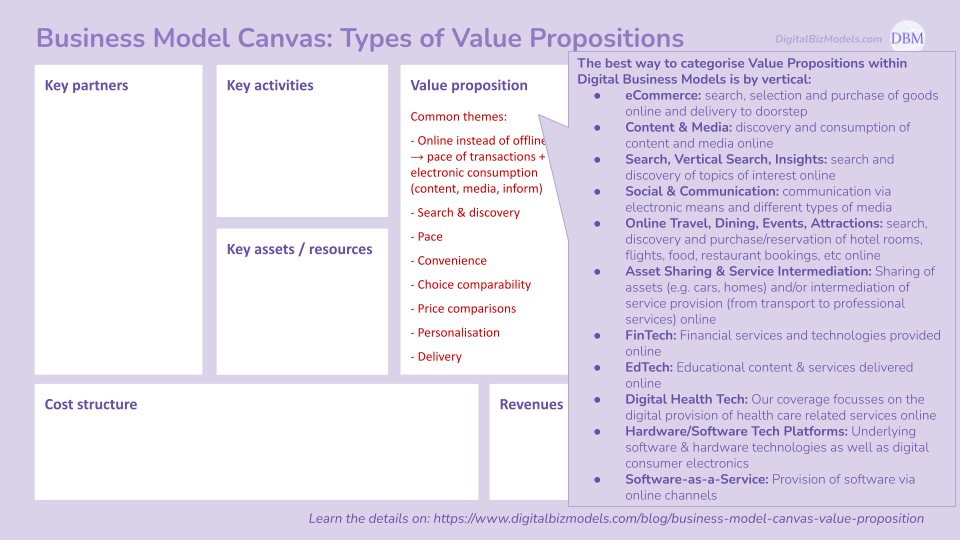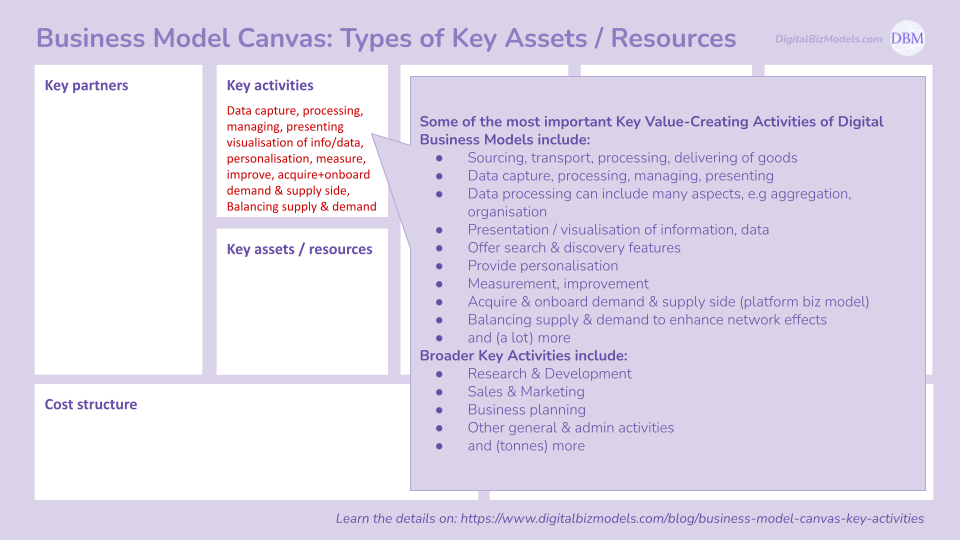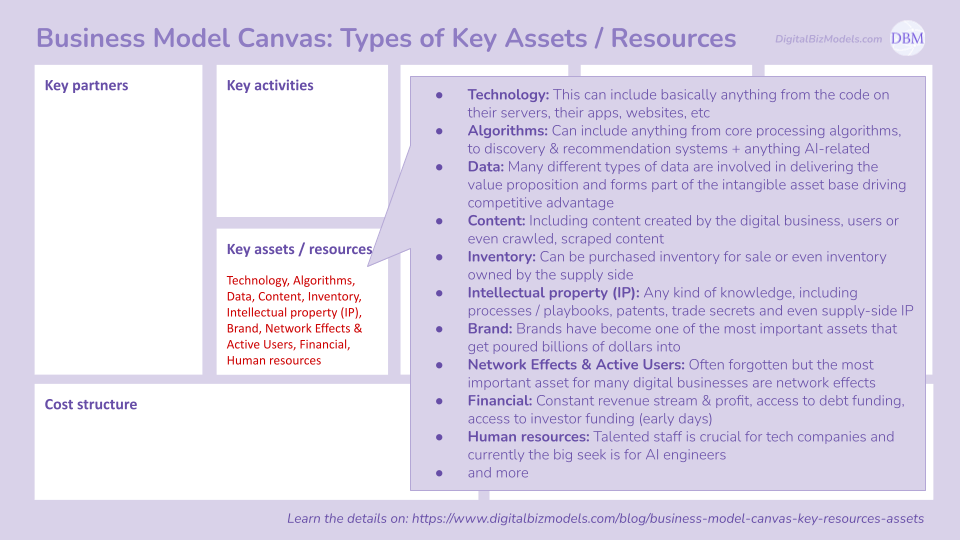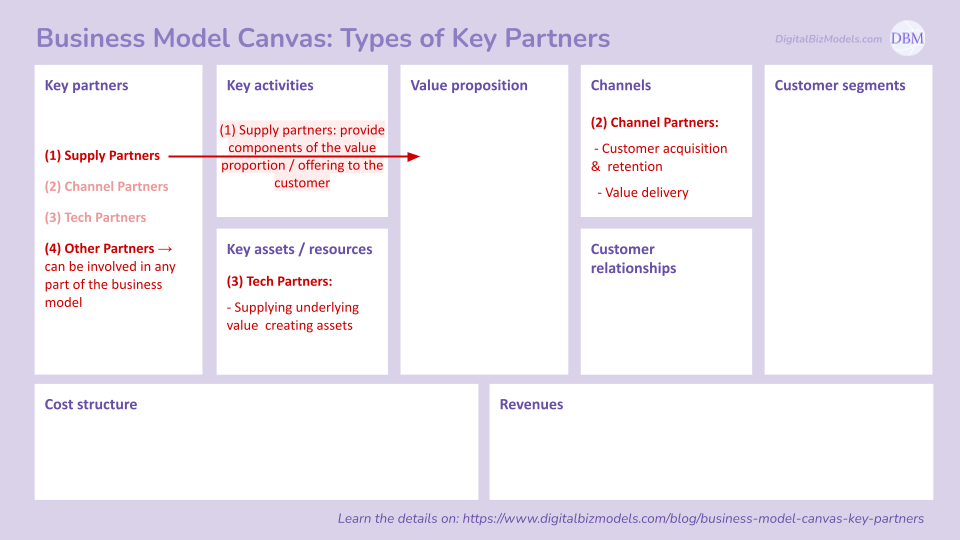Business Model Canvas - Revenue
This article will cover the various types & examples of Revenue generation tailored to digital business models.
Revenue generation is one of the sections of the popular Business Model Canvas tool.
The Business Model Canvas was devised by Alex Osterwalder
Typical types of Revenue generation within digital business models shown in the biz model canvas
(1) Types of Revenue generation
Typical Revenue generation of Digital Business Models look like the below:
Inventory sales & margin (merchant and/or producer)
Commission
Subscription model: can be a bundling, recurring provision of goods or access
Service model / fees
Pay-per-use or pay-on-demand
Advertising
Licensing
Ancillary revenues
And other, e.g. licensing, right-of-use, affiliate, referral, donation, etc
Of course there is more detail to each of the above but this is a far more comprehensive list than you will find elsewhere
Course
Digital Business Models
11 Verticals of Disruption
The only online course that systematically covers the major types of digital business models, revealing 200 Playbook Tactics and 70 Monetisation Tactics all presented in the Business Model Canvas
(2) Examples of Revenue generation
Now let’s take a look at examples of Revenue generation. The best way to do so is - as always - by looking at concrete, vertical-specific examples.
eCommerce
Examples of digital businesses in the eCommerce vertical include Amazon, Etsy, Wayfair and thousands of others.
Revenue generation Amazon:
Based on their annual report 2022, Amazon makes 43% of their revenue through their linear/direct eCommerce business model, 23% through their Marketplace (being a platform biz model), 15% through Amazon Web Services, 7% through advertising service, 7% through subscription services (Prime being the biggest one). Amazon Online Stores fall under a linear business model which is incorrectly stated by many as a platform biz model. Only Amazon Marketplace is a platform business model within Amazon’s eCommerce endeavours.
Here’s the revenue breakdown in 2022:
Online stores: $220b (43%)
Physical stores: $19b (4%)
Retail third-party seller Services: $118b (23%)
Subscription services: $35b (7%)
Advertising Services $38b (7%)
AWS: $80b (15%)
Other: $4b (1%)
Content & Media
Examples of digital businesses in the Content & Media vertical include Netflix, YouTube, Spotify, Medium, Apple News and many more:
Revenue generation Netflix:
Main revenues come from streaming with following plans:
Ad-layer (new in 2023)
Basic
Standard
Premium (main differences are in the number of streams, picture quality)
Some newer streams (for the stated purpose of creating fandom):
Merchandise (Netflix shop)
Upcoming: events and Netflix House
Potential future:
Licensing out their own content
Sharing economy
Examples of digital businesses in the Asset & Service Sharing (=Sharing Economy) vertical include Uber, DoorDash, Airbnb among others:
Revenue generation examples Uber:
Uber Mobility creates value by enabling and managing transport services provided by a supply side (drivers) and a demand side (riders). And Uber makes money by taking a commission of 25% on each such transaction. Their aggregate take rate (=commission) on Uber Mobility/Rides was between 23.5%-28.9% in Q1’22-Q1’23
Uber Eats / Delivery enables transactions between restaurants, drivers and takeaway diners. The revenue model and service charges are more complex in this case and have led to an aggregate take rate of 18.1%-20.6% in the same period
Delivery increasingly extends to delivering groceries and other daily goods
Online Travel
Revenue generation examples Booking.com:
Reservation of accommodation, rental cars, etc generate commissions and fall into the agency business model
Their meta search engine Kayak.com earns advertising revenues on a cost per click pricing model
OpenTable earns commissions but also subscription services for their reservation management system
Travel insurance fees
Revenues generated by Booking.com’s BookingSuite accommodation marketing and business analytics services
Actual revenues as of Q2 2023:
Agency business model ~47%
Merchant business model ~47%
Advertising and other revenues ~5%
Social Media & Search
Examples of digital businesses in the Social Media vertical includes Meta’s Facebook, Instagram, X. Examples of Search Platforms include Google, Bing and others.
Revenue generation Google:
Google Services:
Google advertising:
Google Search & other $162b
YouTube ads $29b
Google Network $33b
Google advertising (total) $224b
Google other* $29b
Google Services (total) $254b (ads plus other)
Google Cloud $26b
Other bets $1b
Hedging $2b
Total revenues $283b
Software-as-a-Service:
Examples of digital businesses in the Software-as-a-Service vertical include Salesforce, most Adobe products and hundreds of thousands more cloud-based software products:
Revenue generation examples productivity SaaS:
In almost all cases, most of the revenue is generated based on subscription pricing, i.e. a recurring monthly/annual fee. In addition, almost always subscriptions are based on the number of users
Then there are typically 2-3 paid layers with a clear pricing. Often it's differentiating between small teams/firms and larger ones based on the premise that larger teams need more extensive functionality
Lastly, we often see an additional layer that has customised pricing because it offers customisable security, auditabiility and other admin features often of interest for large enterprises









